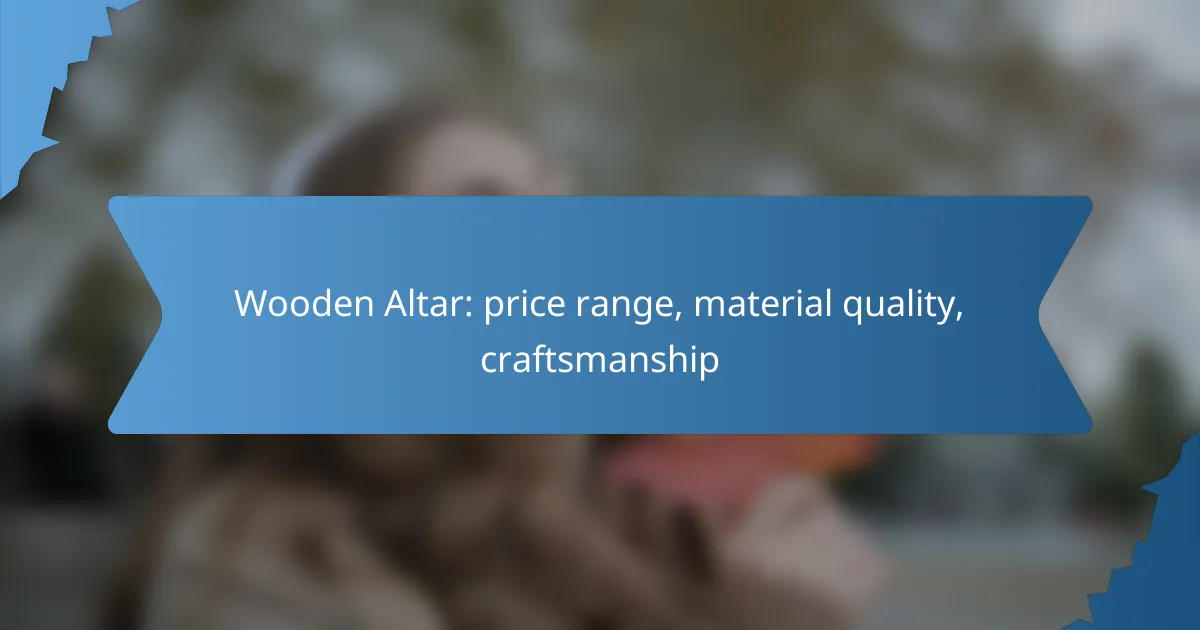Wooden altars in the US can range in price from a few hundred to several thousand dollars, influenced by material quality, craftsmanship, and design complexity. Typically crafted from hardwoods like oak, maple, and cherry, these altars offer varying durability and aesthetic appeal. The level of craftsmanship plays a crucial role in determining the final price, as skilled artisans contribute to the detail and uniqueness of each piece.

What is the price range for wooden altars in the US?
The price range for wooden altars in the US varies significantly based on factors such as material quality, craftsmanship, and design complexity. Generally, you can expect to pay anywhere from a few hundred to several thousand dollars depending on these elements.
Low-end price range
Low-end wooden altars typically cost between $200 and $600. These altars are often made from less expensive woods like pine or plywood, and may feature simpler designs with minimal craftsmanship. They are suitable for basic needs or temporary setups.
When considering a low-end altar, check for durability and finish quality, as these can affect longevity and overall appearance. While they may serve their purpose, be cautious of overly cheap options that might compromise on structural integrity.
Mid-range price range
Mid-range wooden altars generally fall within the $600 to $1,500 bracket. These altars are usually crafted from higher-quality woods such as oak or maple and often include more intricate designs and better craftsmanship. They provide a balance between affordability and aesthetic appeal.
Investing in a mid-range altar can offer better durability and a more polished look. Look for features like detailed carvings or custom finishes that enhance the altar’s visual impact and functionality.
High-end price range
High-end wooden altars can range from $1,500 to over $5,000. These pieces are often made from premium hardwoods like cherry or walnut and are typically handcrafted by skilled artisans. The craftsmanship involved usually includes elaborate designs, custom features, and superior finishes.
When purchasing a high-end altar, consider the reputation of the craftsman and the uniqueness of the design. High-quality materials and expert craftsmanship not only enhance the altar’s beauty but also ensure it lasts for generations.
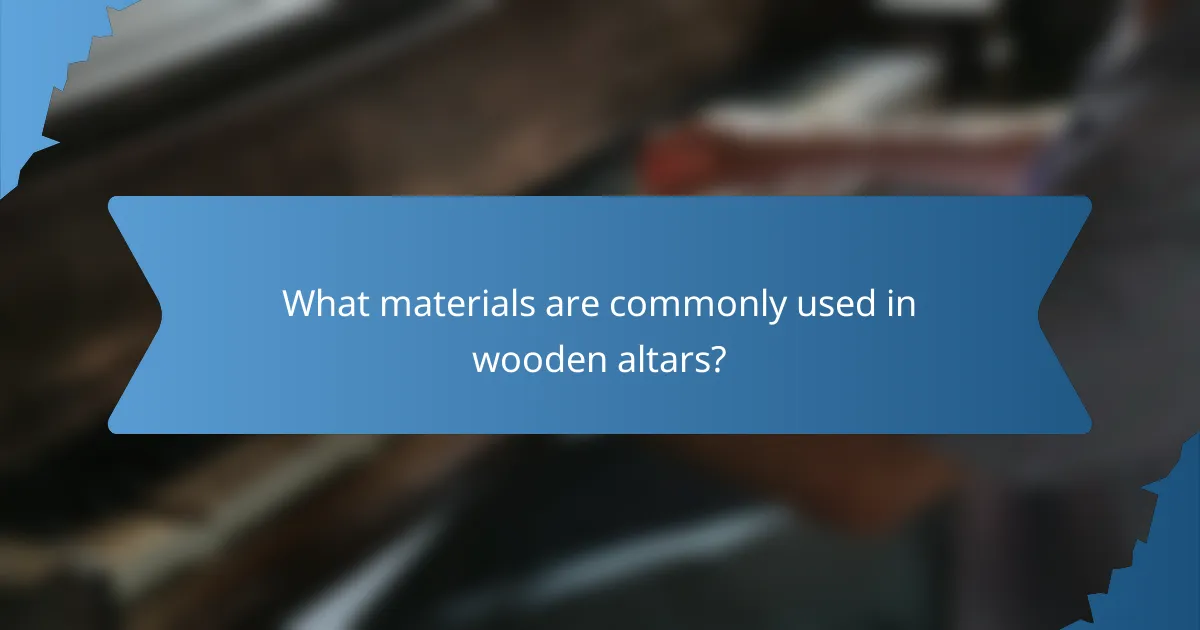
What materials are commonly used in wooden altars?
Wooden altars are primarily made from various types of hardwoods and softwoods, each offering unique characteristics. Common materials include oak, maple, cherry, and pine, which vary in durability, appearance, and cost.
Types of wood used
Hardwoods like oak and cherry are favored for their strength and aesthetic appeal, making them ideal for high-quality altars. Softwoods such as pine are more affordable and easier to work with, but they may not offer the same longevity or visual richness as hardwoods.
Some altars may also incorporate exotic woods like mahogany or teak, which provide distinctive grain patterns and colors, but these can significantly increase the price. When selecting wood, consider both the visual impact and the intended use of the altar.
Material quality indicators
Quality indicators for wooden altars include the wood’s grain pattern, finish, and overall craftsmanship. A well-crafted altar will have a smooth finish, tight joints, and minimal knots or imperfections in the wood.
Additionally, look for signs of durability, such as resistance to warping or cracking. Higher-quality woods often come with a higher price tag, typically ranging from a few hundred to several thousand dollars, depending on the size and intricacy of the design.
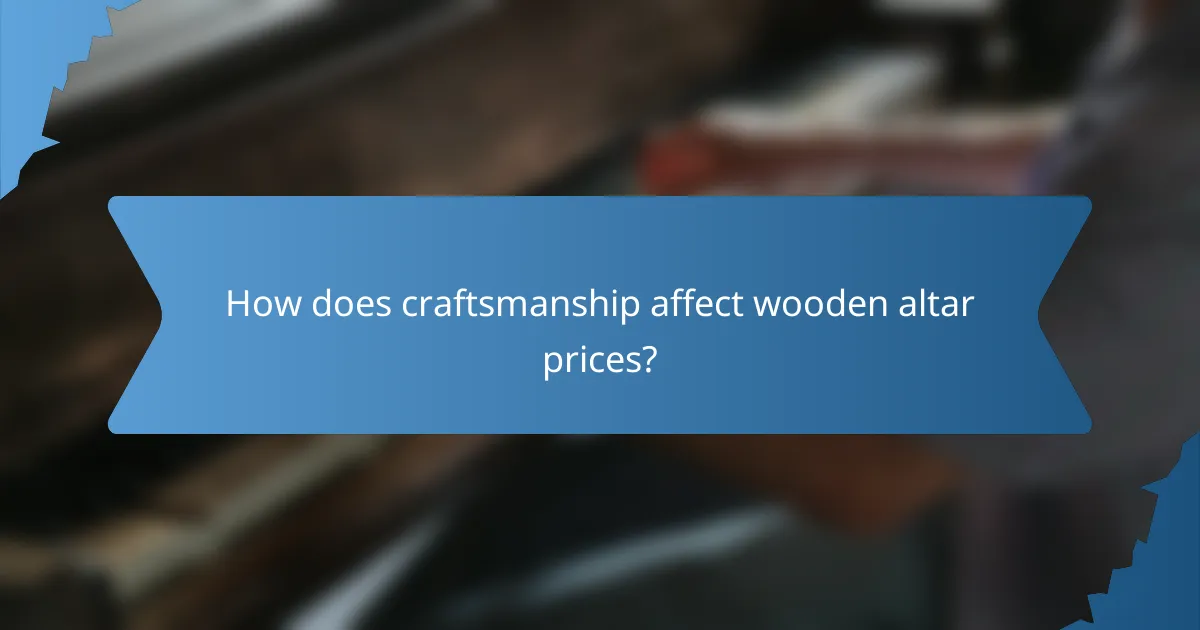
How does craftsmanship affect wooden altar prices?
Craftsmanship significantly influences the prices of wooden altars, as it determines the quality, detail, and uniqueness of each piece. High-quality craftsmanship often results in higher costs due to the skill, time, and materials involved in creating a well-crafted altar.
Impact of craftsmanship on pricing
The level of craftsmanship can lead to a wide price range for wooden altars, typically from a few hundred to several thousand dollars. Factors such as the intricacy of the design, the type of wood used, and the artisan’s experience all contribute to the final price. For instance, a simple altar made from common wood may cost around $300, while a highly detailed altar crafted from premium hardwood can exceed $3,000.
Additionally, custom designs or those featuring intricate carvings often command higher prices due to the additional labor and artistic skill required. Buyers should consider the balance between their budget and the craftsmanship level they desire.
Examples of skilled artisans
Skilled artisans often specialize in specific styles or techniques that enhance the quality of wooden altars. For example, artisans who use traditional joinery methods without nails can create more durable and aesthetically pleasing pieces. Notable artisans may also incorporate unique finishes or inlays that elevate their work above mass-produced options.
Artisans from regions known for woodworking, such as Eastern Europe or parts of Asia, often have a rich heritage of craftsmanship that influences their work. Engaging with these artisans can lead to finding unique altars that reflect both cultural significance and exceptional quality.
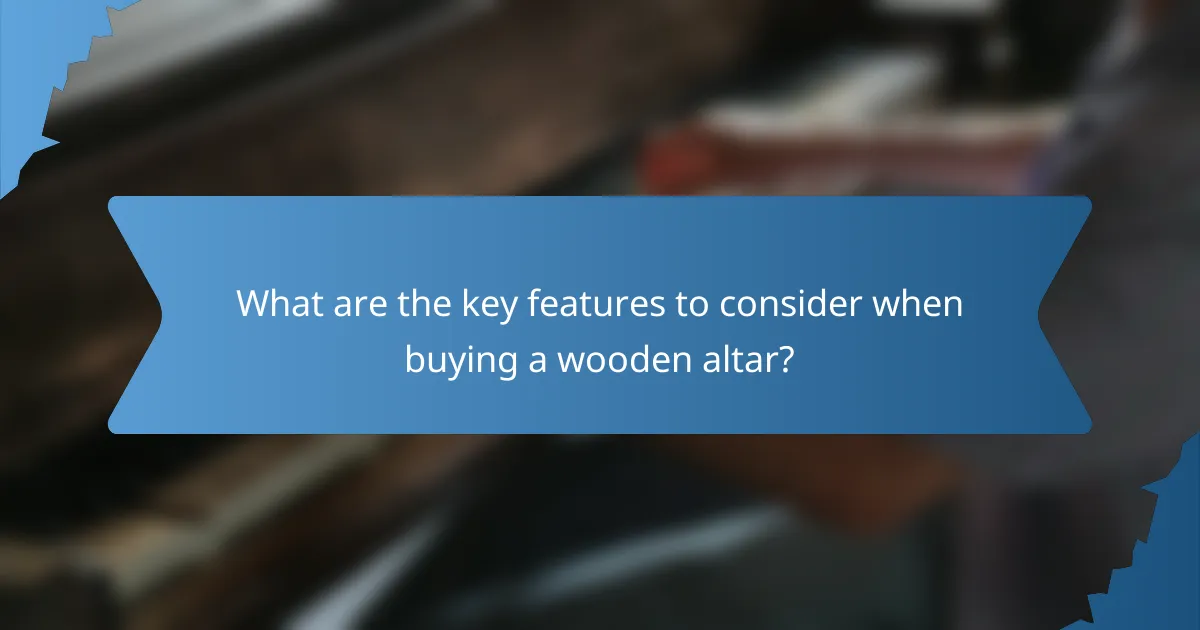
What are the key features to consider when buying a wooden altar?
When purchasing a wooden altar, consider design, material quality, craftsmanship, and maintenance needs. These factors will significantly impact both the altar’s aesthetic appeal and its longevity.
Design and aesthetics
The design of a wooden altar should reflect your personal style and the intended use, whether for worship, meditation, or decoration. Look for features such as intricate carvings, finishes, and the overall shape that resonate with your preferences.
Common styles include traditional, modern, and minimalist, each offering unique visual elements. For example, a traditional altar may feature ornate carvings, while a modern one might focus on clean lines and simplicity.
Durability and maintenance
Durability is crucial when selecting a wooden altar, as it should withstand regular use and environmental factors. Hardwoods like oak, maple, and cherry are typically more durable than softwoods, making them better choices for longevity.
Maintenance requirements vary by finish and wood type. Regular dusting and occasional polishing can help maintain the altar’s appearance. Avoid placing it in direct sunlight or damp areas to prevent warping or fading.
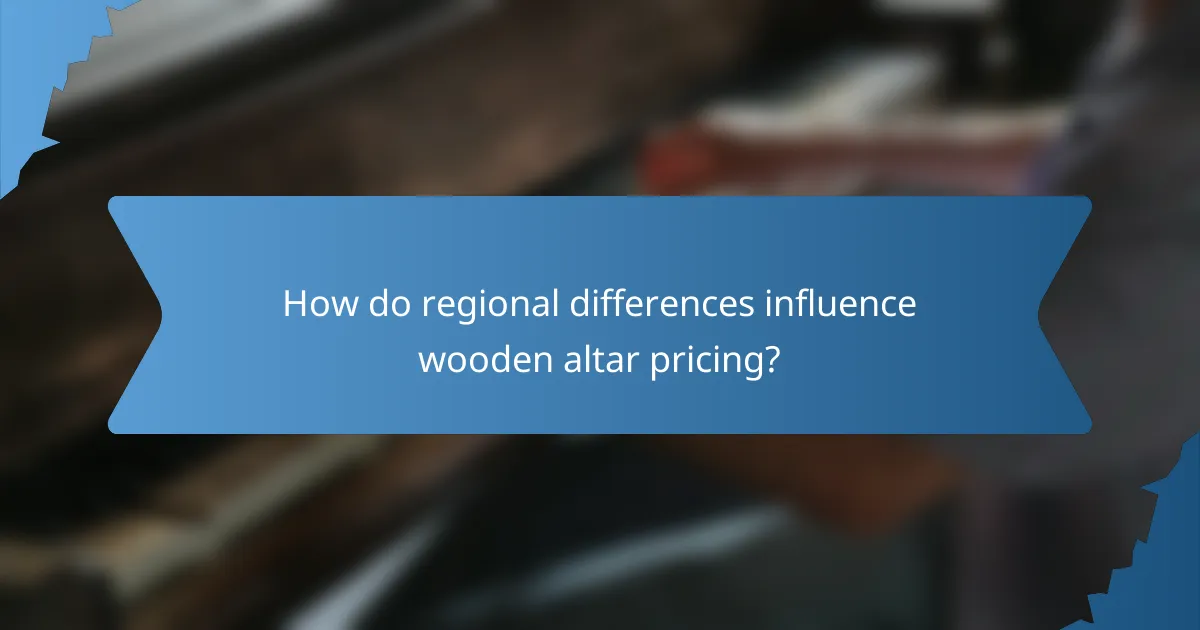
How do regional differences influence wooden altar pricing?
Regional differences significantly impact the pricing of wooden altars due to variations in material availability, labor costs, and local demand. Factors such as craftsmanship quality and the type of wood used also play crucial roles in determining the final price.
Price variations across the US
In the United States, wooden altar prices can range from a few hundred to several thousand dollars, depending on the region. For instance, altars made in areas with abundant hardwood forests, like the Midwest, may be more affordable due to lower shipping costs and material availability.
Conversely, altars crafted in regions with higher living costs, such as California or New York, often command higher prices. On average, expect to pay between $500 and $2,500 for a quality wooden altar, with custom designs potentially exceeding $5,000.
Local craftsmanship influences
The level of craftsmanship can vary widely across different regions, affecting both quality and price. Areas with a rich tradition of woodworking, such as the Appalachian region, often produce altars with intricate designs and superior craftsmanship, which can justify higher prices.
When purchasing a wooden altar, consider the reputation of local artisans and their techniques. Investing in a handcrafted piece from a skilled craftsman can enhance the altar’s aesthetic and spiritual value, making it a worthwhile expenditure.

What are the benefits of investing in a high-quality wooden altar?
Investing in a high-quality wooden altar offers significant advantages, including enhanced durability and a unique aesthetic that can elevate spiritual practices. Quality materials and craftsmanship ensure that the altar not only lasts for years but also adds a sense of beauty and reverence to any space.
Longevity and durability
A high-quality wooden altar is built to withstand the test of time, often lasting decades with proper care. Look for solid hardwoods like oak, cherry, or walnut, which are known for their strength and resistance to wear.
Regular maintenance, such as polishing and avoiding excessive moisture, can further extend the life of the altar. Investing in a well-constructed piece can save money in the long run, as you won’t need to replace it frequently.
Aesthetic appeal
The aesthetic appeal of a wooden altar is unmatched, as each piece showcases unique grain patterns and colors that enhance its beauty. A well-crafted altar can serve as a focal point in a room, creating an inviting atmosphere for meditation or worship.
Consider the design elements that resonate with you, such as carvings or finishes, which can reflect personal beliefs or cultural significance. A high-quality altar not only serves a functional purpose but also enriches the overall ambiance of your space.

What are the trends in wooden altar design?
Current trends in wooden altar design emphasize a blend of aesthetics and functionality, focusing on sustainable materials and innovative craftsmanship. Many artisans are incorporating both modern and traditional elements to create unique pieces that resonate with spiritual significance while appealing to contemporary tastes.
Modern vs traditional styles
Modern wooden altars often feature minimalist designs with clean lines and a focus on functionality. These altars may use lighter woods and incorporate elements like glass or metal to create a contemporary look.
In contrast, traditional styles emphasize ornate carvings and rich, dark woods, reflecting cultural heritage and craftsmanship. These altars typically showcase intricate details and are often larger, designed to serve as a focal point in worship spaces.
Eco-friendly materials
Eco-friendly materials are increasingly popular in wooden altar design, with many artisans opting for sustainably sourced woods such as bamboo, reclaimed timber, or certified hardwoods. These materials not only reduce environmental impact but also add a unique character to each piece.
When choosing an eco-friendly altar, consider the finish as well. Non-toxic stains and sealants can enhance the wood’s natural beauty while ensuring safety for both users and the environment. This approach aligns with a growing demand for sustainable practices in religious and spiritual communities.
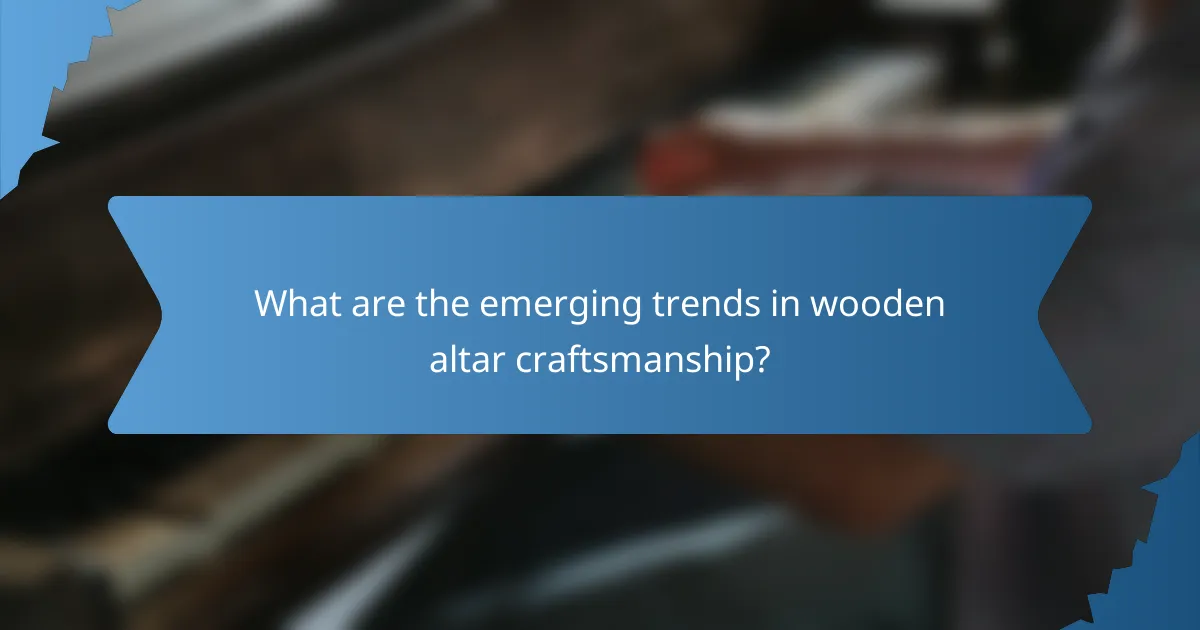
What are the emerging trends in wooden altar craftsmanship?
Emerging trends in wooden altar craftsmanship focus on sustainability, innovative designs, and personalized features. Artisans are increasingly using eco-friendly materials and techniques while incorporating unique elements that reflect individual beliefs and aesthetics.
Innovative techniques
Craftsmen are adopting advanced methods such as laser cutting and CNC machining to create intricate designs that were previously difficult to achieve by hand. These techniques allow for precision and consistency, enabling artisans to produce detailed patterns and shapes that enhance the altar’s visual appeal.
Additionally, the use of reclaimed wood is becoming popular, as it not only promotes sustainability but also adds character and history to each piece. This approach often results in unique textures and colors, making every altar distinct.
Artisans are also experimenting with mixed materials, combining wood with metals or glass to create modern interpretations of traditional altars. This fusion can appeal to a broader audience, blending contemporary aesthetics with spiritual significance.
